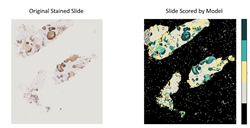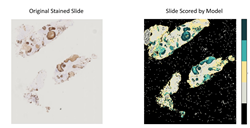Computer-aided algorithms are helping pathologists more efficiently and accurately identify cancer stages to deliver targeted treatment.

Original Stained Slide on Left and What the Computer “Sees” on the Right
“While this challenge was ambitious, it is not so dissimilar from the other ongoing computer vision solutions NLP Logix has previously delivered.” Matt Berseth, Lead Scientist, NLP Logix
JACKSONVILLE, FL – JULY 13, 2016
Jacksonville-based advanced data analytics and machine learning solutions company NLP Logix continues to lead the way in the emerging field of computer vision, receiving recognition as the only United States team to deliver a top-winning solution in an international competition to develop a machine learning model that can help identify and treat cancer cells by stage level.
NLP Logix recently earned a top-three finish position in the HER2 Challenge, an academic research competition sponsored by the University of Warwick’s Department of Computer Science. More than 100 data science teams worldwide competed in the challenge which asked applicants to create algorithms to automate “scoring” of large-file images of stained slides of breast cancer cells based on the aggressiveness of the cancer. The method is used to detect the presence of the gene for HER2, a transmembrane growth factor receptor which is found in about 20 percent of cases of invasive cancer.
Digital pathology is an emerging field in the medical industry, but the process of evaluating whole-slide, large pixel images of tissue specimens can be labor intensive and time consuming for pathologists attempting to detect cancer or identify metastases.
Under NLP Logix Lead Scientist Matt Berseth, the Jacksonville team has built upon its computer vision capabilities through its proprietal LogixStudio machine learning toolkit, which the company has developed over the past five years and continues to refine as new technologies and algorithms emerge.
According to Berseth, “The HER2 Challenge is another great example of how automation in the form of computer vision can be used to achieve high quality results in a timely manner through automated systems. While this challenge was ambitious, it is not so dissimilar from the other ongoing computer vision solutions NLP Logix has previously delivered.”
Dr. Nasir M. Rajpoot, a computer science professor at the University of Warwick who helped organize the HER2 Challenge, said that the development of algorithms to interpret and identify cancer slides helps pathologists better assess them.”We understand that the task of automated HER2 scoring has a significant clinical utility by reducing the subjectivity in the process of cancer diagnostics,” said Rajpoot. “We are excited by the level of interest this contest has generated and the performance of top algorithms which are expected to reduce the pathologist workload.”
In April, NLP Logix ranked high in the CAMELYON16 Challenge, which asked participants to develop algorithms to detect cancer metastasis in lymph node images.
Ted Willich, CEO of NLP Logix, said, “We are very excited to have such great initial success with our computer vision offering, both in the competitions as well as delivering solutions to a number of customers. We believe it will be a big driver of our growth over the next few years.”





